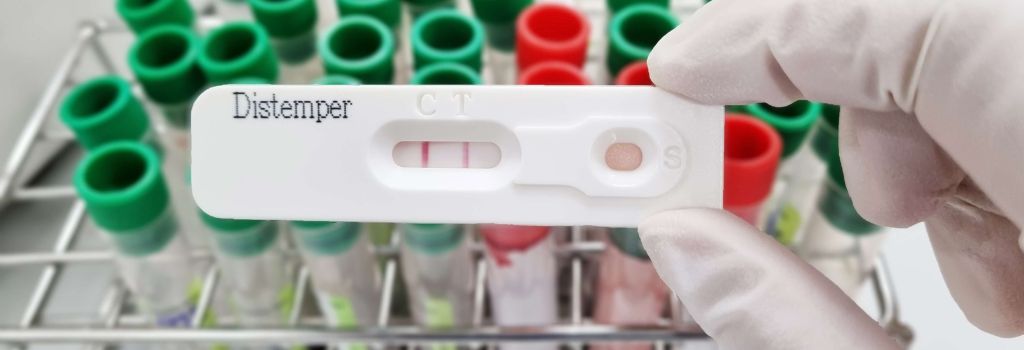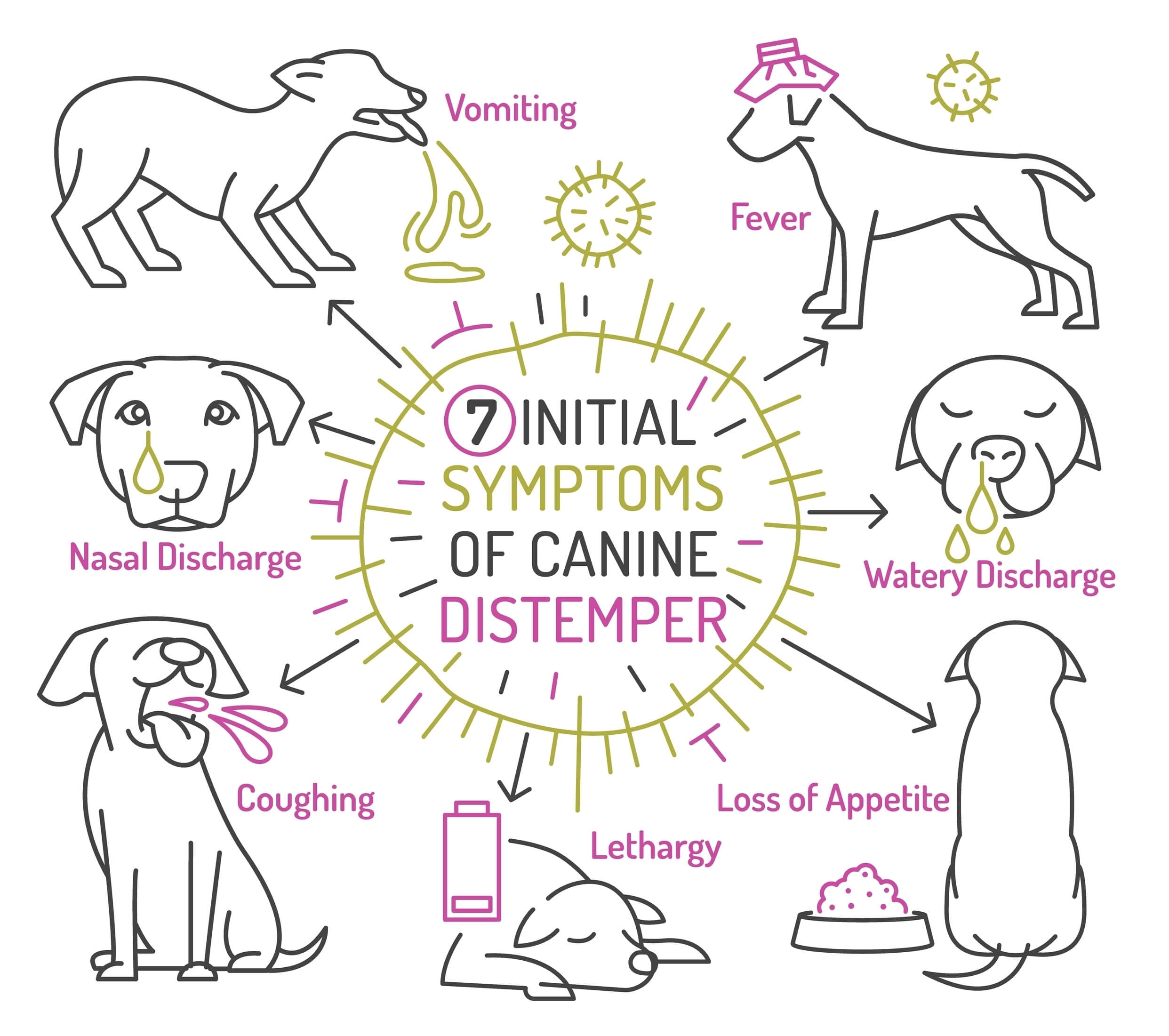If you own a dog or cat, you’ve likely heard that your pet is getting their distemper vaccine and just went along with it. But what is this deadly virus, and how can you protect your pets from it? Canine distemper claims the lives of many puppies, with mortality rates reaching up to 50% in severe cases. Feline distemper is even more lethal, with a staggering mortality rate of up to 90% in young kittens and unvaccinated cats.
Here’s the silver lining: vaccination has dramatically reduced the incidence of both diseases in areas with high vaccination rates. Let’s dive into the world of distemper virus, so you know what you’re up against and why it’s crucial to keep your pet protected.

Understanding the Distemper Virus
Canine Distemper
Canine distemper is a severe viral disease caused by the Canine Distemper Virus (CDV). This highly contagious virus doesn't just affect dogs; it also targets animals like ferrets, raccoons, and skunks. CDV primarily attacks the respiratory, gastrointestinal, and nervous systems, posing a significant threat to young or unvaccinated dogs. The virus's ability to impact multiple body systems leads to a wide range of symptoms and complications.
The transmission of CDV is alarmingly efficient! The virus spreads through direct contact with an infected animal's bodily fluids, such as saliva, urine, and blood. Dogs can catch it by sharing food and water bowls, grooming each other, or simply being near an infected animal. Additionally, CDV can be airborne, spreading through inhaled respiratory droplets. This makes the virus particularly dangerous in places where dogs congregate, such as kennels, shelters, and dog parks. Even contaminated objects like bedding and toys can harbor the virus, further contributing to its spread.
Feline Distemper
Feline distemper, also known as feline panleukopenia, is a severe and often fatal disease caused by the Feline Parvovirus (FPV). This virus targets rapidly dividing cells in the body of a cat, including those in the intestines, bone marrow, and developing fetus. It poses a significant threat to felines, especially young kittens and those without proper vaccination.
The Feline Parvovirus is incredibly resilient and capable of surviving in the environment for long periods. This durability makes it easy for cats to contract the virus. FPV is present in all bodily fluids, such as feces, urine, saliva, and nasal discharge. The virus spreads through direct contact with an infected cat or contaminated environments. Cats can become infected by sharing food and water bowls, grooming each other, or simply being near an infected cat. Additionally, the virus can spread through contaminated surfaces, food, water, bedding, and grooming tools, making it a pervasive threat in any setting where cats are present.

Recognizing Canine Distemper Symptoms
The signs of this disease are vast, and dogs affected by this virus may exhibit many different categories of symptoms. Respiratory symptoms such as coughing, sneezing, nasal and eye discharge, and difficulty breathing, and gastrointestinal issues like vomiting, diarrhea, loss of appetite, and weight loss are common. Nervous system symptoms such as seizures, muscle twitches, circling behavior, head tilt, and partial or complete paralysis can occur as the disease progresses and can be alarming for any pet owner. General symptoms may include fever, lethargy, and a rough coat. The severity of these symptoms can vary significantly, with some dogs recovering fully and others experiencing long-term complications or, sadly, death.
Recognizing Feline Distemper Symptoms
Cats with this virus often show gastrointestinal symptoms, including vomiting, severe and bloody diarrhea, loss of appetite, dehydration, and abdominal pain. Systemic symptoms like fever, lethargy, depression, and sudden death, especially in kittens, are unfortunately common. The disease can lead to anemia, a low white blood cell count, and secondary infections due to a weakened immune system. Given the rapid progression and severe nature of feline distemper, recognizing these signs early and seeking prompt veterinary care is imperative.
Vaccination of Canine and Feline Distemper Viruses
Vaccination is the best line of defense against canine and feline distemper. Having your pets vaccinated, you significantly reduce the risk of them contracting these highly contagious and potentially fatal viruses. Vaccines stimulate the immune system to recognize and combat the distemper virus effectively, providing long-term immunity. Regular vaccinations, as recommended by your veterinarian, not only safeguard your individual pets but also help prevent outbreaks within the broader pet community.
For Dogs:
- Puppies: Begin their vaccination series at six to eight weeks of age. Follow up with boosters as recommended by your veterinarian.
- Adult Dogs: Preventive care can save your dog! Your dog needs regular vaccine boosters to maintain immunity, so it's important to keep vaccinations current.
For Cats:
- Kittens: Start their vaccination series at six to eight weeks of age, followed by boosters according to your veterinarian's recommendation.
- Adult Cats: Your cat needs regular booster vaccines to maintain immunity, so it's important to keep vaccinations current.
How to Protect Your Pet from Distemper
- Vaccination is Critical: Have your pets vaccinated according to your veterinarian's recommended schedule. This is the most effective way to protect them from distemper!
- Avoid Exposure: Gradually introduce your pet to new environments and other animals in a controlled manner and confirm that any new animals your pet interacts with are healthy and vaccinated.
- Maintain Hygiene: Regularly clean and disinfect your pet's living area, including bedding, food and water bowls, and toys. Use pet-safe disinfectants to eliminate any potential virus particles from surfaces. Be cautious when bringing your pet to places where many animals congregate, such as parks, shelters, or kennels. Confirm these areas maintain good hygiene practices. Most importantly, limit your pet’s contact with unknown or unvaccinated animals.
- Monitor Health: Schedule routine check-ups with your veterinarian to monitor your pet's health and catch any early signs of illness. Discuss any changes in your pet’s behavior or health promptly with your veterinarian, and watch for any symptoms of distemper, such as coughing, sneezing, vomiting, diarrhea, or lethargy. Provide a balanced diet and manage any existing health issues that could weaken your pet’s immune system, making them more susceptible to infections.
- Consult Your Vet: If you suspect your pet has been exposed to distemper or is showing symptoms, seek veterinary care immediately. Early intervention can save your pet!
Keeping Your Pet Protected
Vaccinating your dogs and cats against distemper is one of the most important steps you can take to protect your pet. By keeping up to date on your pet’s vaccines against these viruses, you significantly reduce their risk of contracting these diseases and help prevent the spread of the virus in your community.
Regular vaccinations are not only a safeguard for your pets but also a responsible practice for maintaining public health. Remember, a simple vaccination can make the difference between life and death for your pets! Consult your veterinarian, be sure your pets are up-to-date on their distemper vaccinations, and give them the best chance for a healthy, happy life.
If you have questions and you'd like to reach out to us, you can call us directly at (567) 361-3407, or you can email us at [email protected]. Don't forget to follow us on social media Facebook, Instagram.

